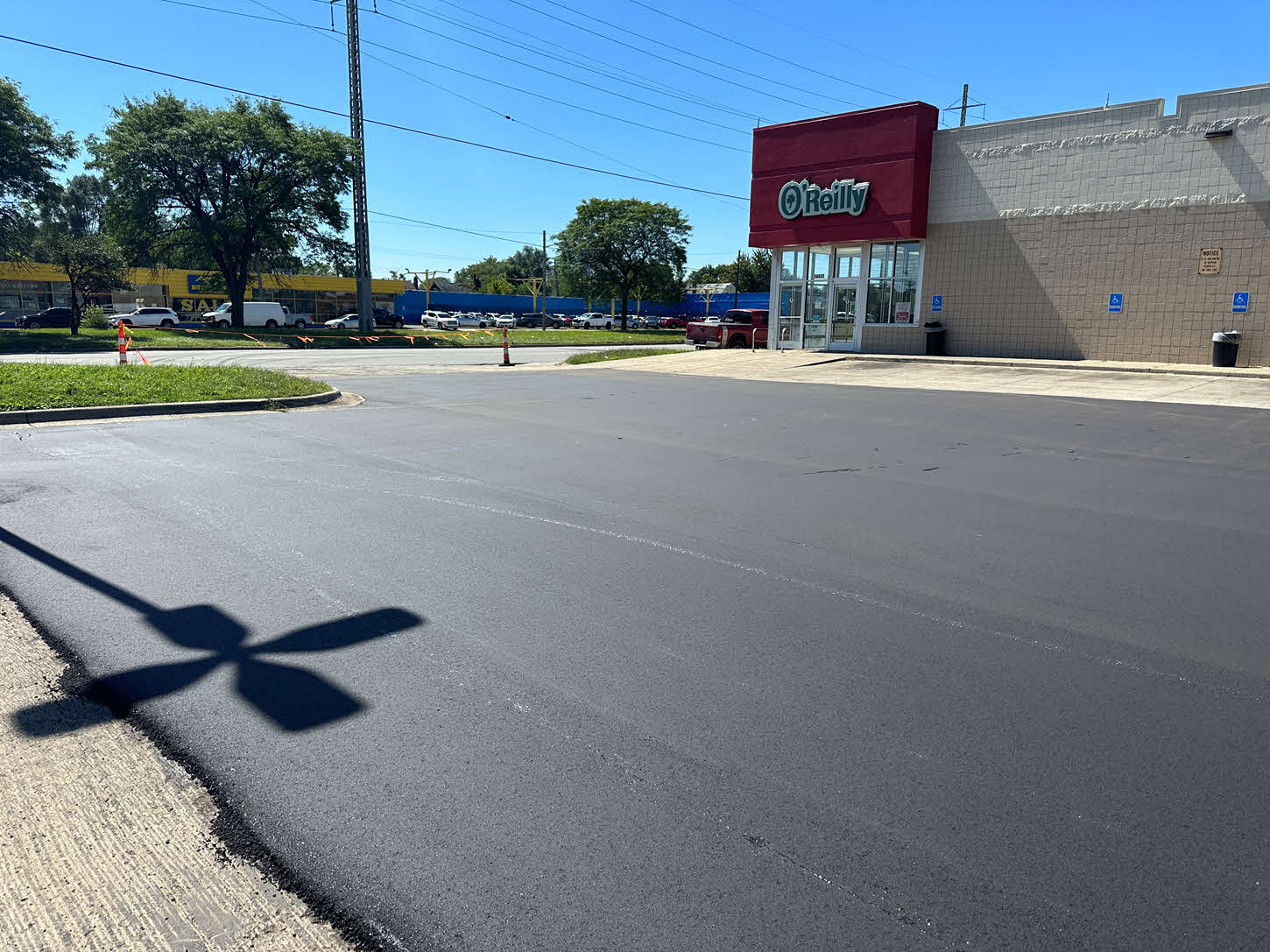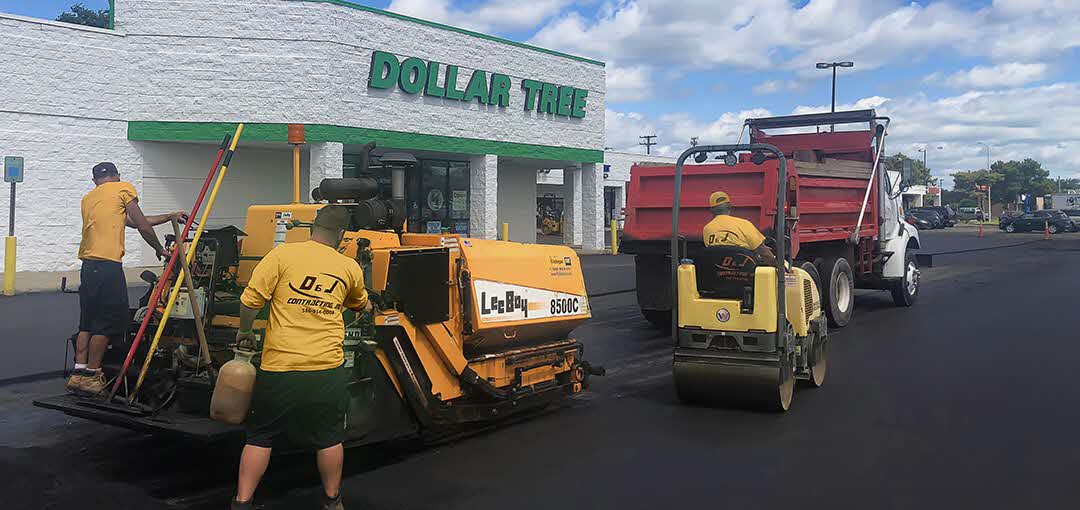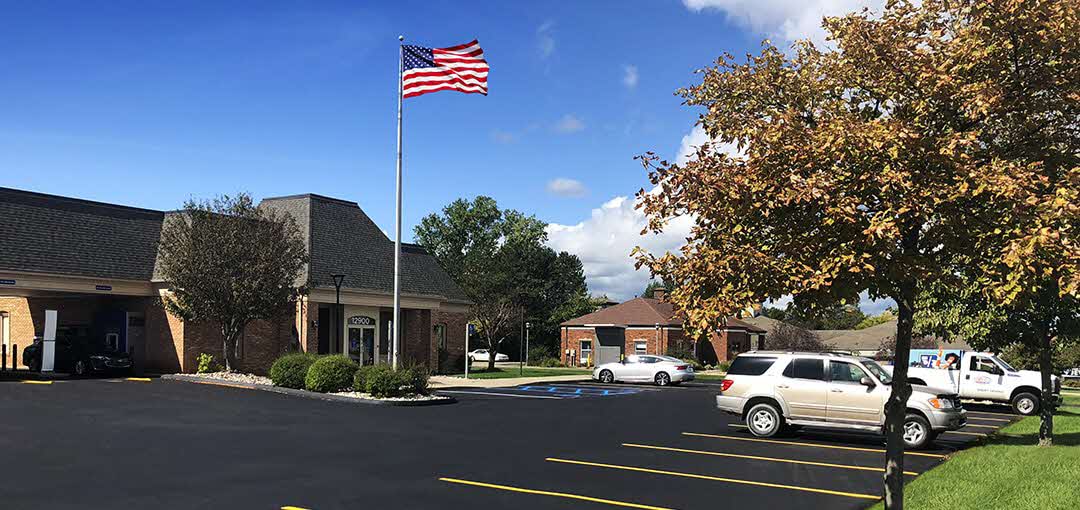Asphalt Grinding inUtica, MI
Precision Asphalt Grinding for a Smooth, Durable Surface
We Are Locally Owned & Operated For Over 37 Years
Contact Us Today!
We Serve Businesses In And Around The Following Cities:
About Asphalt Grinding
Asphalt Grinding for Commercial Properties in Utica
The Importance of Asphalt Grinding
In the bustling city of Utica, commercial properties strive to keep their exterior landscapes not only functional but also visually appealing. One of the critical aspects of maintaining such spaces is ensuring a smooth, well-maintained asphalt surface. This is where asphalt grinding becomes indispensable. This process plays a pivotal role in both the maintenance and resurfacing of roads, parking lots, and other paved surfaces, bringing about a plethora of benefits that impact functionality and aesthetics. By seamlessly removing layers of old or damaged asphalt, and preparing the surface for new application, asphalt grinding helps businesses maintain a safe and attractive exterior. This guide will delve into the multifaceted process of asphalt grinding, exploring its numerous benefits and real-world applications and conveying why D&J Contracting could be your ideal partner in this endeavor.
Understanding the Asphalt Grinding Process
The process of asphalt grinding, sometimes referred to as milling, begins with the systematic removal of the top layer of asphalt, often to a predetermined depth. This is achieved using specialized machinery equipped with a rotating drum that harbors many teeth to cut and grind the surface. Compared to a full pavement replacement, grinding is cost-effective and reduces the time required for surface rehabilitation. Additionally, this method allows the reuse of the existing surface aggregate, promoting sustainability by minimizing waste. With a focus on precision and efficiency, professional asphalt grinding services are essential for ensuring that the new surface will adhere perfectly and last longer.
In the vibrant business environment of Utica, the demand for skilled and experienced asphalt grinding companies, like D&J Contracting, has grown noticeably. Such companies provide expert services that ensure commercial properties remain inviting to patrons and clients. A well-executed grinding job results in a smooth surface, which is not only aesthetically pleasing but also enhances traction and improves the lifespan of the pavement. This leads to lower maintenance costs in the long run, a crucial consideration for many businesses today.
Benefits to Commercial Properties
Commercial properties in Utica recognize that maintaining high-quality pavement goes far beyond appearances. The benefits of asphalt grinding are numerous and extend into various fundamental aspects of property management. From a safety perspective, a smooth, even surface minimizes the risk of accidents and injuries caused by uneven or deteriorated pavement. This is particularly valuable for high-traffic areas, such as parking lots and driveways, which regularly accommodate both vehicular and pedestrian traffic.
Moreover, the economic benefits of asphalt grinding cannot be overstated. By restoring a paved area at a fraction of the cost of full replacement, businesses are able to allocate their resources more efficiently, saving on repair and maintenance costs. In a competitive market like Utica, where every dollar counts, the affordability of quality asphalt grinding services presents an appealing option for business owners. As an environmentally mindful choice, it aligns with the increasing push towards sustainable business practices; the reusability factor of ground asphalt is a significant draw for eco-conscious companies aiming to reduce their carbon footprint.
Real-World Applications and Practical Insights
The diverse applications of asphalt grinding extend across many sectors of the Utica business community. Retail outlets, malls, office complexes, and other commercial entities benefit from freshly ground and resurfaced asphalt. Customers and clients are more likely to frequent establishments where parking areas and driveways are well-maintained, contributing to increased foot traffic and potentially higher revenue. Furthermore, this service is invaluable for warehouse facilities and logistics centers that rely on smooth, durable pavement for truck operations, frequently receiving goods and managing large volumes of transportation activity.
Another practical application of asphalt grinding is in the area of drainage improvement. By removing worn-out layers and regrading the surface, companies can address problems like standing water, which can lead to costly damages. Through expert services provided by reputable asphalt grinding companies, such as D&J Contracting, property managers are equipped with the tools they need to rectify these issues effectively and prevent future liabilities.
In the real estate development sector, smooth and visually appealing pavements can significantly enhance the property’s overall value. Asphalt grinding services thus become a strategic investment. A well-kept exterior speaks to quality, inviting potential buyers or tenants and setting a positive first impression. It’s a subtle yet powerful investment in the long-term success of a property. Property developers in Utica are increasingly acknowledging the importance of this service when crafting plans for new developments or renovating existing structures.
Choosing the Right Professional Services
With such significant benefits and applications, selecting the right partner for asphalt grinding is crucial for achieving the best results. In Utica, the reputation of asphalt grinding companies plays a pivotal role in the decision-making process for property managers eager to revitalize their spaces. Companies like D&J Contracting bring local expertise and a proven track record to the table, ensuring projects are completed efficiently and to a high standard.
When searching for “asphalt grinding companies near me,” it becomes essential to consider factors like the company’s experience, equipment capabilities, and customer service quality. Professionalism, punctuality, and the ability to tailor services to the specific needs of a property are qualities to look for. The need for expert input extends beyond just technical execution; it involves a comprehensive understanding of local regulations and environmental considerations as well.
D&J Contracting leverages years of experience in Utica, delivering nuanced solutions that align with city regulations and client expectations. By building relationships based on trust and integrity, they maintain a high satisfaction rate among their clientele. This dedication to meeting and exceeding the needs of property managers makes them a valued partner in commercial property maintenance and development endeavors.
What Lies Ahead for Asphalt Grinding in Utica
As businesses in Utica continue to thrive and evolve, the role of effective asphalt maintenance becomes increasingly central to commercial success. The demand for reliable asphalt grinding services grows in tandem, as property owners and managers seek cost-effective, sustainable solutions to maintain and enhance their exteriors. This ensures continued operational success while also making a positive contribution to the community’s aesthetic appeal.
The introduction of newer technologies and machinery in the field also promises exciting advancements in the years ahead. Businesses that ally themselves with forward-thinking companies like D&J Contracting are poised to benefit from these technological innovations. As the city of Utica expands, the commitment to maintaining its paved environments as welcoming and safe spaces will serve as a cornerstone of its economic and social development. By investing in skilled services today, commercial property owners position themselves for a future of continued growth and prosperity.
In conclusion, asphalt grinding is an indispensable asset for commercial properties, offering a harmonious blend of economic, aesthetic, and environmental advantages. Recognizing its significance and potential, businesses in Utica are increasingly opting for reliable, expert services such as those provided by D&J Contracting. Engaging in this maintenance practice not only boosts the operational efficiency and visual appeal of commercial facilities but also anchors a connection to sustainable development in a growing city. Property owners eager to take advantage of these opportunities would do well to consider how such services can effectively advance their objectives.
Asphalt Grinding Gallery


Call Us Today to receive your Free Quote for
Asphalt Grinding in Utica
Serving: Utica, Michigan

About Utica, Michigan
The city now known as Utica was platted by Joseph Stead in 1829, who named it “Harlow”. Others referred to the community as “Hog’s Hollow” or “McDougalville”, until a few years later it was named “Utica” by settlers from New York, in honor of the city of the same name in that state. This was common of settlers in this region, and is reflected in the names of nearby cities such as Rochester, Troy, and Livonia that are also named for New York cities.
By the 1940s, Utica was the center of a region of dairy farms and truck gardens. It had a flour mill and shipped rhubarb. Dodge Park a few miles south on the Clinton River was a state park.
As the 1950s progressed, Detroit auto companies began to build factories in neighboring Sterling and Shelby Townships, and the surrounding area began a transformation to an industrial economy.
Utica boasts a small historic district centered on Cass Avenue and Auburn Road, but few of the buildings antedate 1906, due to destructive fires in 1905 and 1906.
Utica is in western Macomb County, bordered to the south by the city of Sterling Heights and to the north by Shelby Charter Township. Highways M-53 and M-59 serve the city. M-53 crosses the east side of the city, leading north 13 miles (21 km) to Romeo and south 8 miles (13 km) to Warren, while M-59 runs along the southern border of the city, leading east 8 miles (13 km) to Interstate 94 and west 15 miles (24 km) to Pontiac. Downtown Detroit is 21 miles (34 km) to the south.
According to the U.S. Census Bureau, Utica has a total area of 1.78 square miles (4.61 km), of which 0.02 sq mi (0.05 km) is covered by water. The Clinton River passes through the center of the city, flowing southeast and then east to Lake St. Clair.
| Census | Pop. | Note | %± |
|---|---|---|---|
| 1880 | 493 | — | |
| 1890 | 563 | 14.2% | |
| 1900 | 562 | −0.2% | |
| 1910 | 496 | −11.7% | |
| 1920 | 588 | 18.5% | |
| 1930 | 873 | 48.5% | |
| 1940 | 1,022 | 17.1% | |
| 1950 | 1,196 | 17.0% | |
| 1960 | 1,454 | 21.6% | |
| 1970 | 3,504 | 141.0% | |
| 1980 | 5,282 | 50.7% | |
| 1990 | 5,081 | −3.8% | |
| 2000 | 4,577 | −9.9% | |
| 2010 | 4,757 | 3.9% | |
| 2020 | 5,245 | 10.3% | |
| U.S. Decennial Census | |||
As of the census of 2010, 4,757 people, 2,218 households, and 1,245 families were living in the city. The population density was 2,781.9 inhabitants per square mile (1,074.1/km). The 2,463 housing units had an average density of 1,440.4 per square mile (556.1/km). The racial makeup of the city was 90.4% White, 1.9% African American, 0.5% Native American, 3.5% Asian, 1.9% from other races, and 1.8% from two or more races. Hispanics or Latinos of any race were 3.8% of the population.
Of the 2,218 households, 23.6% had children under 18 living with them, 37.8% were married couples living together, 14.0% had a female householder with no husband present, 4.3% had a male householder with no wife present, and 43.9% were not families. About 38.0% of all households were made up of individuals, and 15.9% had someone living alone who was 65 or older. The average household size was 2.13 and the average family size was 2.80.
The median age in the city was 41.7 years; The age distribution was 17.9% under 18; 8.8% from 18 to 24; 27.4% from 25 to 44; 28.3% from 45 to 64; and 17.4% were 65 or older. The gender makeup of the city was 47.4% male and 52.6% female.
As of the census of 2000, 4,577 people, 1,952 households, and 1,184 families resided in the city. The population density was 2,578.2 inhabitants per square mile (995.4/km). The 2,005 housing units had an average density of 1,129.4 per square mile (436.1/km). The racial makeup of the city was 93.77% White, 0.92% African American, 0.37% Native American, 2.56% Asian, 0.74% from other races, and 1.64% from two or more races. Hispanics or Latinos of any race were 2.10% of the population.
Of the 1,952 households, 27.2% had children under 18 living with them, 43.8% were married couples living together, 13.3% had a female householder with no husband present, and 39.3% were not families. About 34.2% of all households were made up of individuals, and 10.8% had someone living alone who was 65 or older. The average household size was 2.29 and the average family size was 2.96.
In the city, the age distribution was 21.0% under 18, 9.6% from 18 to 24, 31.7% from 25 to 44, 23.2% from 45 to 64, and 14.5% who were 65 or older. The median age was 37 years. For every 100 females, there were 92.9 males. For every 100 females 18 and over, there were 91.8 males.
The median income for a household in the city was $38,683, and for a family was $57,156. Males had a median income of $36,912 versus $26,353 for females. The per capita income for the city was $21,615. About 4.8% of families and 7.0% of the population were below the poverty line, including 6.7% of those under 18 and 17.3% of those 65 or over.
Utica Community Schools operates public schools, including Utica High School, Eppler Junior High School, Flickinger Elementary School, and Wiley Elementary School. They serve the communities of Sterling Heights, Utica, and Shelby Township.
Call Us Today to receive your Free Quote for
Asphalt Grinding in Utica
Related Services in Utica, Michigan
We Serve Businesses In The Following Zip Codes:
48007, 48015, 48021, 48026, 48035, 48036, 48038, 48042, 48043, 48044, 48045, 48046, 48047, 48048, 48050, 48051, 48066, 48071, 48080, 48081, 48082, 48083, 48084, 48085, 48088, 48089, 48090, 48091, 48092, 48093, 48098, 48099, 48225, 48230, 48236, 48310, 48311, 48312, 48313, 48314, 48315, 48316, 48317, 48318, 48397